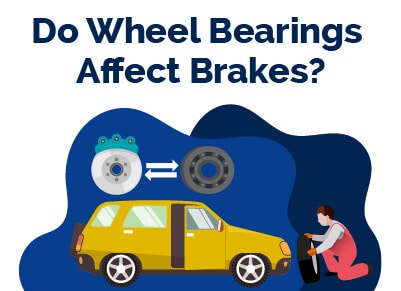Do Wheel Bearings Affect Brakes?
February 19, 2024


I am a serial entrepreneur and a consumer advocate. When I’m not helping car buyers, I love working on ventures that have a positive impact.
I run a cause marketing agency and serve on the board of Vayu Global Health where we are disrupting the medical industry and preventing the needless deaths of mothers and babies during childbirth.
Wheel bearings do affect the brakes! Your brake rotors will wobble if you have a bad or loose wheel bearing.
Sometimes, the wheel bearings might not directly impact the brakes, but their influence on the wheels affects the performance of the brakes.
Will the wrong installation cause problems with the brakes? Yes.
Let’s guide you through all you need about wheel bearings and brakes to help you make informed decisions.
Key Takeaways
- Wheel bearings directly influence brake performance.
- A bad wheel bearing can lead to a low brake pedal.
- Wheel bearing issues do not cause brakes to lock up, but it can cause rear wheel lockup.
- Recognizing the signs of a bad wheel bearing and its potential impact on braking systems is essential for vehicle safety
Table of Contents
How Wheel Bearings Affect Brakes
A bad wheel bearing is one of the top causes of a low brake pedal.
A bad wheel bearing causes rotors to wobble, pushing the piston back to the caliper. This causes a bad operation in the brake pedal.
When the piston is pushed far back into the caliper housing, mechanics usually misplace this for a master cylinder. But the truth is, this is typically the cause of a bad wheel bearing.
Sometimes, the wheel bearing affects the brakes by influencing the position of the wheels. When the wheels loosen, they will wobble anytime it rotates.
Because the brake rotor is attached to the wheels, the wobbling will push the rotor far from the brake pad. This will make the brake pad travel longer than usual to contact the rotor.
Can a Bad Wheel Bearing Cause Brakes To Lock Up?
No. A bad wheel bearing cannot cause the brakes to lock up. However, it might cause the rear wheels to lock up.
This is because if the wheel bearing is worn out or has failed, it affects the wheel hub.
Can Wheel Bearing Cause Brake Vibration?
Yes. Wheel bearing causes brake vibration. The brake rotor is directly connected to the wheel bearings. Any slight changes, faults, or issues on the wheel bearing will reflect on the brakes.
When the wheel bearings are worn, the wheels become loose, instituting a play on the wheels, which can cause a vibration when you hit the brakes. This does not mean that the brake pads will start vibrating under your feet.
The bad wheel bearing will cause a vibration in the wheel region close to the brakes. You can notice the acceleration when you drive or try to accelerate.
What Happens When a Wheel Bearing Goes Bad?
Understanding what happens when a wheel bearing goes bad will help you figure if you can still drive the vehicle.
Here are some major things that happen when a wheel bearing goes bad.
- Vibrations on the steering wheel
- Loose car Handling
- Loss of grip on steering wheel
- Poor drive precision
- Unusual noise from your wheels
- Wobbling wheels
- Uneven wear of your tires
Summary
Wheel bearings affect the brakes, but it’s just that many car users ignore their impact. Some of the problems that your brakes have can caused by the wheel bearing on the brakes.
The damage from the wheel bearing is not limited to the brakes but also the wheel hub or CV joints.
Best Car Deals by Category
Frequently Asked Questions
Can a bad wheel bearing cause grinding when braking?
Yes, a bad wheel bearing can cause grinding when braking! A bad wheel bearing will cause a “play” in your wheels, causing them to wobble when it spins. This will cause runouts in the rotor, leading to brake pad wear, leading to grinding when braking.
Can a bad wheel bearing cause brakes to squeak?
A bad wheel bearing might not cause the brakes to squeak, but it can significantly influence the wheels. This can cause squeaking, growling, or rumbling noise from the wheels—sounds that are mostly mistaken for a worn tire.
How long do wheel bearings last?
Wheel bearings last up to 75,000 to 150,000 miles, but it depends on how well you maintain them and the type of wheel bearing used.
Do wheel bearings have anything to do with brakes?
Yes, wheel bearings are relevant to brakes. Wheel bearings are tightly aligned to your brake rotors. This makes it easy for the wheel bearing to influence the performance of your brake rotors.
Are wheel bearings part of the braking system?
Yes, wheel bearings are integral parts of your brake system. They are positioned in alignment with the wheels and rotors. If the wheel bearings are bad, the brakes are affected.
Can bad wheel bearings damage rotors?
Yes, wheel bearings can damage the rotors. The wheel bearing can cause wobbling of the brake rotors, causing damage to the rotors.
Posted in Car Buying Tips, Car Troubleshooting |




